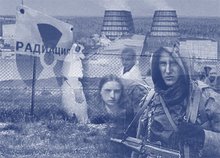September 29, 2009
DOE Deputy Secretary and Rosatom Director Visit Y-12, Oak Ridge National Laboratory During First Meeting of U.S.-Russian Nuclear Energy and Nuclear Security Working Group
Discussions emphasize mutual efforts to counter emerging threats to nuclear materials and cooperation on civil nuclear technologies
WASHINGTON, D.C. — The Department of Energy today announced that Deputy Secretary of Energy Daniel Poneman and Director General of the State Atomic Energy Corporation “Rosatom” Sergei Kiriyenko held the first meetings of the joint U.S.-Russian Nuclear Energy and Nuclear Security Working Group on Monday, September 28 and Tuesday, September 29.
The meetings opened with a session hosted by U.S. Secretary of Energy Steven Chu, who met with Director Kiriyenko and Deputy Secretary Poneman to discuss a variety of issues. These included the two countries’ mutual work securing vulnerable nuclear materials, efforts to increase cooperation on civil nuclear technologies, and cooperation on other nuclear security issues.
The meetings, which concluded with a plenary session co-chaired by Deputy Secretary Poneman and Director Kiriyenko this morning, were the first since the working group was established under the U.S.-Russia Bilateral Presidential Commission during the July 2009 Presidential Summit. In addition to discussions in Washington, the meetings included a visit by Director Kiriyenko and Deputy Secretary Poneman to the National Nuclear Security Administration’s Y-12 National Security Complex and Oak Ridge National Laboratory (ORNL) in Oak Ridge, Tenn.
“The United States and Russia have a long and successful track record of cooperation in the area of nuclear security,” said Deputy Secretary of Energy Daniel Poneman. “These meetings and our visits to Oak Ridge National Laboratory and the Y-12 National Security Complex demonstrate how seriously our countries take our shared responsibility to promote peaceful uses of nuclear energy while combating nuclear dangers. I look forward to continuing this record by expanding our cooperation in fulfillment of our Presidents’ Joint Statement.”
“This visit is devoted to an in depth discussion of the issues of nuclear energy and nuclear security as stipulated by the mandate from the Presidents of the Russian Federation and the United States,” said Director Kiriyenko. “We are looking forward to the expansion of our bilateral cooperation on these issues.”
The Nuclear Energy and Nuclear Security Working Group was established under the U.S.-Russia Bilateral Presidential Commission during the July 2009 Presidential Summit and is co-chaired by Deputy Secretary Poneman and Director Kiriyenko. As stated in their Joint Statement on Nuclear Cooperation, President Obama and President Medvedev recognized the special responsibility of the United States and Russia for security of nuclear weapons and agreed to broaden and deepen U.S.-Russian long-term cooperation to further increase the level of security of nuclear facilities around the world.
After their meeting with Secretary Chu, Deputy Secretary Poneman and Director Kiriyenko flew to Tennessee to visit ORNL and Y-12, where they observed a joint nuclear security training exercise. At Y-12, Deputy Secretary Poneman and Director Kiriyenko also discussed nuclear materials management issues and toured the recently completed Highly Enriched Uranium Materials Facility.
During their visit to ORNL, Director Kiriyenko and Deputy Secretary Poneman received a briefing at the Radiochemical Engineering Development Center and the Spallation Neutron Source.
For photos of the visit by Deputy Secretary Poneman and Director Kiriyenko to ORNL and Y-12, click here.
While Deputy Secretary Poneman and Director Kiriyenko toured ORNL and Y-12, the remaining U.S. and Russian members of the working group met in Washington to discuss a wide range of topics, including cooperation on nuclear security, nuclear safeguards, nuclear materials consolidation, nuclear emergency operations, and civil nuclear energy cooperation.
As a result of the meeting, a joint action plan formulated by the working group will be forwarded to President Obama and President Medvedev through U.S. Secretary of State Hillary Clinton and Russian Foreign Minister Sergey Lavrov. Secretary Clinton and Foreign Minister Lavrov serve as the Bilateral Commission Coordinators.
Follow NNSA News on Facebook, Twitter, YouTube, and Flickr.
Established by Congress in 2000, NNSA is a semi-autonomous agency within the U.S. Department of Energy responsible for enhancing national security through the military application of nuclear science in the nation’s national security enterprise. NNSA maintains and enhances the safety, security, reliability, and performance of the U.S. nuclear weapons stockpile without nuclear testing; reduces the global danger from weapons of mass destruction; provides the U.S. Navy with safe and effective nuclear propulsion; and responds to nuclear and radiological emergencies in the U.S. and abroad. Visit www.nnsa.energy.gov for more information.
Friday, October 2, 2009
Subscribe to:
Post Comments (Atom)

1 comment:
Good fill someone in on and this enter helped me alot in my college assignement. Say thank you you as your information.
Post a Comment